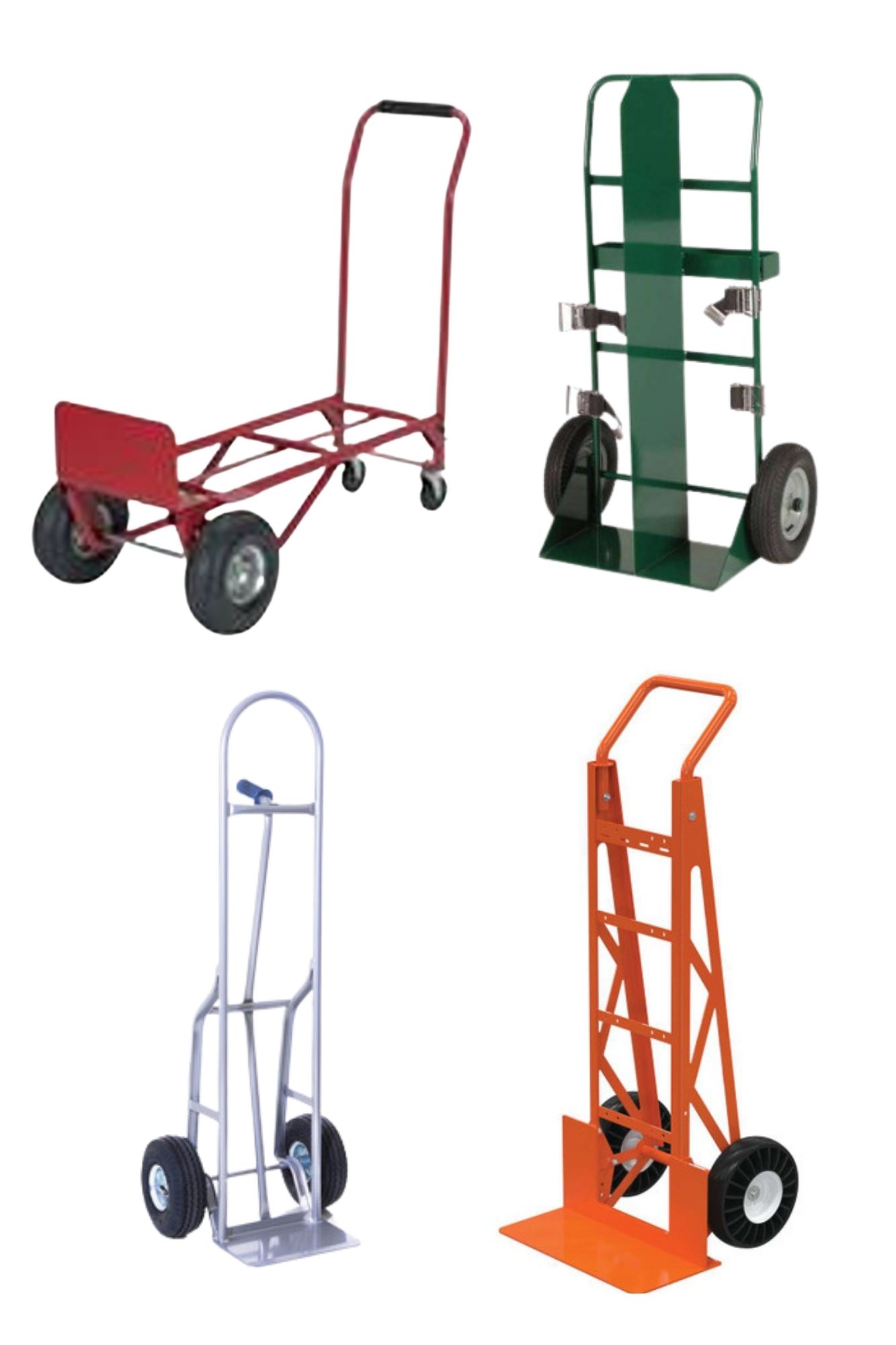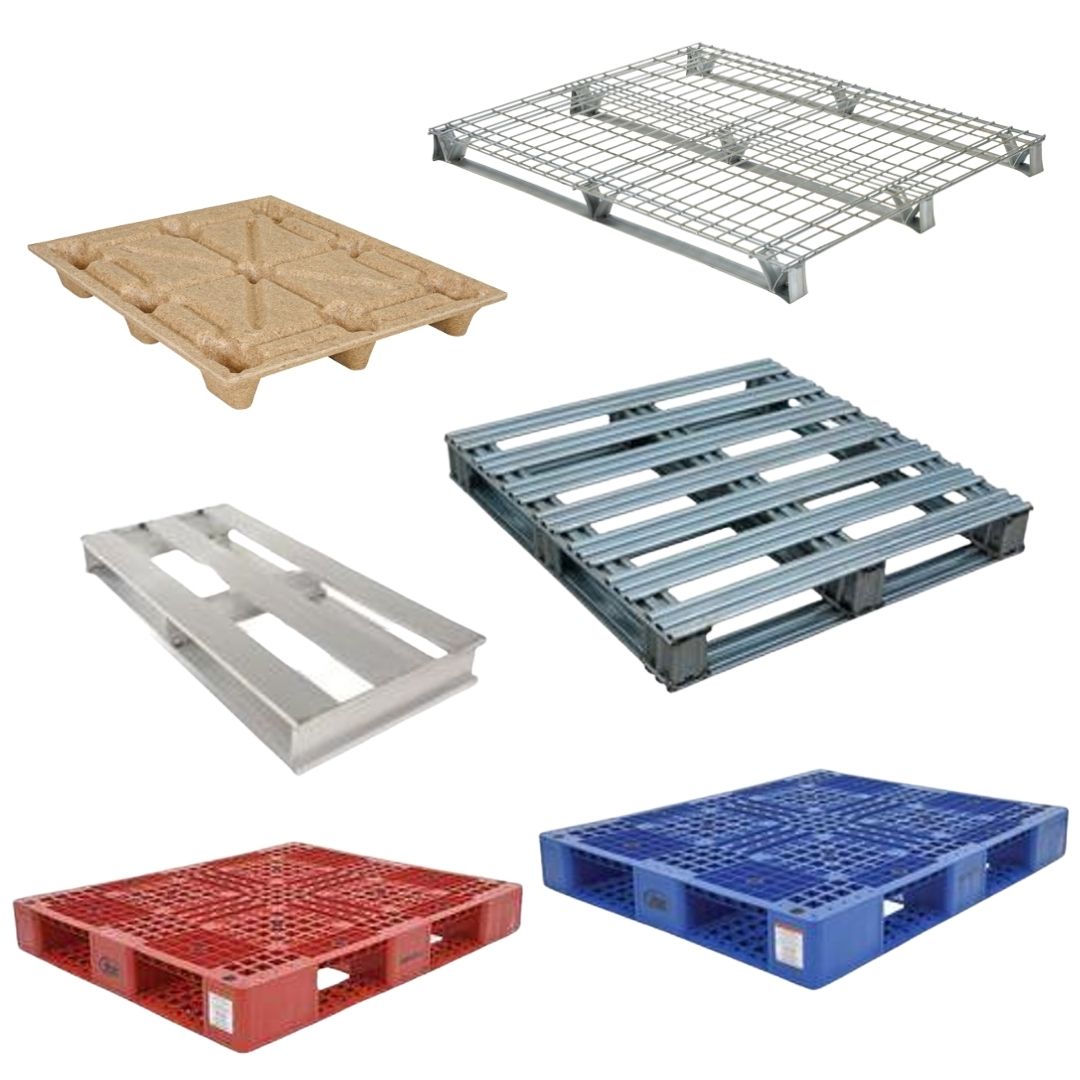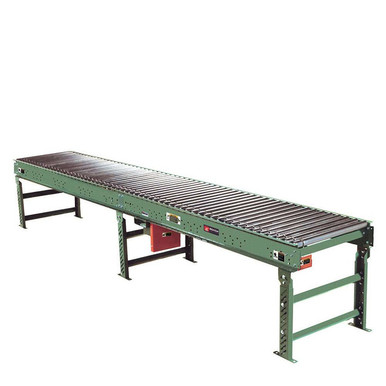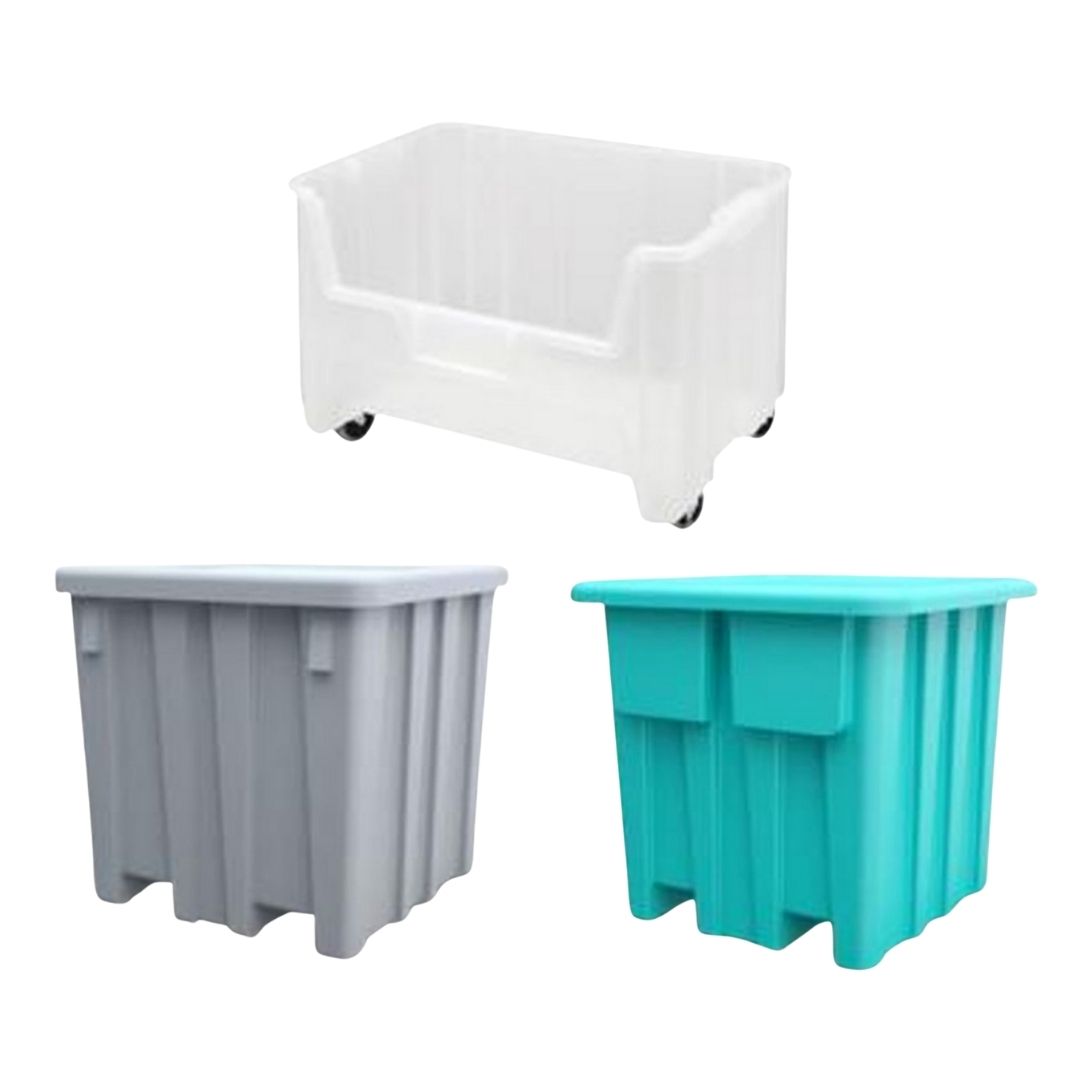Types of Handling Equipment and Their Best Uses
17th Oct 2023
Material handling equipment is classified as any piece of equipment that is used to move, store, or process materials. Material flow systems are essential for businesses of all sizes, from small retailers to large manufacturers. Having the right type of material handling systems in place can significantly impact efficiency, safety, and productivity. In this blog, we'll explore advantages and best uses for common types of material handling equipment.
Hand Trucks

Hand trucks, also known as hand dollies or hand carts, offer a range of advantages in material handling. They are portable, lightweight, and ergonomically designed, thus reducing physical strain on workers and making it easier to transport heavy or bulky items. Their versatility allows them to handle various loads, and they are space-efficient, requiring minimal storage space when not in use. Hand trucks save time, speeding up the transportation of goods and improving workplace safety by decreasing the chances of injuries caused by manual lifting. They are particularly well-suited for navigating tight spaces and are cost-effective compared to larger material handling equipment options. These advantages make hand trucks valuable tools in a wide array of industries, from retail and warehousing to construction, healthcare, and home use.
Hand trucks find their best uses in retail stores and warehouses for moving merchandise, and in the logistics sector for the efficient handling of inventory and parcels. Moving companies rely on hand trucks for the hassle-free relocation of furniture and appliances, while construction sites benefit from their ability to transport heavy materials and tools. In the healthcare sector, they facilitate the movement of medical equipment, and they are used in libraries, educational institutions, and offices for moving books, supplies, and office furniture. Additionally, hand trucks are valuable tools for event organizers, delivery personnel, and individuals in tasks like gardening and home relocation. Their portability, ergonomic design, and efficiency make them a versatile and essential choice for various material handling needs.
Pallets
Pallets are constructed of wood, plastic, or metal and can be stacked on top of each other. By stacking pallets vertically, businesses can maximize their storage space. Pallets also facilitate easy inventory management and enable efficient handling of goods within the facility. Pallets are best suited for storing and organizing materials in warehouses and distribution centers. They allow for easy loading and unloading of goods, as they can be moved using forklifts, pallet jacks, or other material handling equipment. Additionally, palletized shipments are more secure and stable, reducing the risk of damage during transit.

Pallets optimize space utilization and protect products from ground contact and contaminants, reducing the risk of damage. They enhance the stability of stacked goods, promoting safe handling, and contribute to workplace safety by reducing manual lifting injuries. Pallets are easy to handle, whether by manual labor or material handling equipment, such as forklifts. These advantages make pallets essential tools in a wide range of industries, including warehousing, manufacturing, transportation, and retail.
In manufacturing, they facilitate the transportation of raw materials and finished products, aiding in streamlined production processes. Pallets are indispensable for transportation and shipping, making the loading and unloading of goods onto trucks, ships, and airplanes more convenient and minimizing the risk of damage during handling. They are also commonly employed in retail settings for displaying and storing products, simplifying restocking and enhancing the shopping experience. Agriculture, construction, recycling, and the food and beverage industries all benefit from the practicality of pallets in their operations. Additionally, pallets are essential material handling equipment and supplies for international shipping, contributing to the efficient and standardized movement of goods. Their adaptability and utility make them integral to material handling logistics in various sectors and applications.
Forklifts
Forklifts are ideal for transporting heavy pallets and goods over short distances in warehouses, factories, and distribution centers. They provide the necessary maneuverability and lifting capacity to efficiently move and stack loads. They contribute to the efficient flow of materials in manufacturing facilities.
Forklifts find their best uses in a variety of applications, including warehousing and distribution, where they excel at loading and unloading trucks, stacking goods on high shelves, and facilitating the movement of materials within warehouses. In manufacturing, forklifts are essential for transporting raw materials to production lines and handling finished products. They also play a key role in construction by transporting construction materials, lifting heavy components, and positioning supplies. In the agricultural sector, forklifts handle the movement of bulk agricultural products, aid in equipment handling, and manage inventory efficiently. Retail businesses benefit from forklifts when stocking shelves, rearranging merchandise, and moving goods. In logistics, transportation, ports, and freight handling, forklifts are invaluable for efficient cargo loading and unloading, container movement, and storage.
Pallet Jacks
 Pallet jacks offer a host of advantages, making them valuable tools in material handling as well. They are cost-effective, affordable options that require minimal training, making them accessible for businesses of all sizes. Their high maneuverability allows them to navigate tight spaces and congested areas with ease. Pallet jacks are known for their quick operation, and reducing the time and effort required for daily material handling tasks. Furthermore, they contribute to a safer work environment by minimizing the physical strain on operators and reducing the risk of musculoskeletal injuries. Another significant advantage is their independence from external power sources, making them suitable for off-grid locations or areas with limited access to electricity or fuel.
Pallet jacks offer a host of advantages, making them valuable tools in material handling as well. They are cost-effective, affordable options that require minimal training, making them accessible for businesses of all sizes. Their high maneuverability allows them to navigate tight spaces and congested areas with ease. Pallet jacks are known for their quick operation, and reducing the time and effort required for daily material handling tasks. Furthermore, they contribute to a safer work environment by minimizing the physical strain on operators and reducing the risk of musculoskeletal injuries. Another significant advantage is their independence from external power sources, making them suitable for off-grid locations or areas with limited access to electricity or fuel.
Pallet jacks find their best uses in warehousing and distribution, where they efficiently handle palletized loads during loading, unloading, and storage. In retail, these tools assist in organizing merchandise, making restocking and inventory management more manageable. In manufacturing, they aid in transporting materials between production areas. Wholesale and shipping businesses rely on pallet jacks for handling goods, both within warehouses and during the loading and unloading of delivery trucks. In agriculture, these tools transport bulk materials like feed or produce. They are also essential in food and beverage facilities, healthcare settings, and small businesses with limited space and material handling needs. Pallet jacks are versatile, making them invaluable in scenarios where the efficient and manual handling of palletized loads is required.
Conveyor Systems

Conveyor systems offer numerous advantages in various industries. They enhance efficiency by automating material transportation, reducing the reliance on manual labor, and ensuring a consistent and high throughput. This increased efficiency results in labor savings and improved workplace safety. Conveyor systems also optimize space utilization and are flexible enough to handle a wide range of materials, from delicate items to heavy loads. Moreover, they contribute to product quality by preventing damage during transport and expedite material handling, thus saving time in various production and distribution processes. Overall, conveyor systems are essential tools in manufacturing, warehousing, food processing, and many other industries where streamlined and reliable material transport is crucial.
Conveyor systems find their best uses in a wide range of industries. They are integral to manufacturing, automating assembly lines and material handling, while in warehousing and distribution centers, they streamline the movement of products from storage to shipping areas. Conveyor systems play a significant role in food processing, ensuring efficient sorting, packaging, and handling. In mining, they transport raw materials, and the automotive industry relies on them for efficient component assembly. At airports, conveyors help with baggage handling, and they are instrumental in the e-commerce sector, automating package movement in fulfillment centers. Conveyors are also used in agriculture for sorting and transporting produce and in recycling facilities for handling recyclable materials. Furthermore, they support pharmaceutical and healthcare processes by aiding in the production and packaging of medicines and medical devices. In these and many other applications, material flow and conveyor systems are indispensable for improving efficiency, reducing labor costs, and ensuring the safe and reliable transport of materials and products.
Bulk Containers

Bulk containers in the material handling industry provide several key advantages. They are designed for efficient material handling, capable of transporting large volumes of materials with minimal manual labor. These containers are also stackable and nestable when empty, optimizing storage space. They offer crucial protection, safeguarding contents from contamination, moisture, and environmental factors. Durability is a hallmark feature, ensuring long-term use and the reduction of waste. Their reusability contributes to environmental sustainability by reducing single-use packaging. These advantages make bulk containers invaluable for a wide range of applications in agriculture, food processing, manufacturing, automotive, recycling, retail, waste management, pharmaceuticals, textiles, construction, and electronics industries, among others.
Bulk containers, with their versatility and durability, find their best uses in various sectors of the material handling industry. In agriculture, they serve as standards for the storage and transportation of crops and seeds, while the food industry relies on them for bulk ingredients and processed products. Within manufacturing, bulk containers facilitate the efficient storage and transport of raw materials and finished products. The automotive industry depends on these containers for parts and components, and recycling facilities utilize them for collecting and transporting recyclable materials. In retail and distribution, bulk containers play a key role in organizing and transporting bulk goods, and they are essential in waste management for various waste types. Furthermore, they are used in the pharmaceutical industry for the secure storage and transport of materials, in the textile and apparel industries for fabrics and clothing, in the construction industry for materials and tools, and in the electronics industry for electronic components and products. The adaptability and robustness of bulk containers make them a versatile choice in a wide range of material handling applications.
Conclusion
Material handling equipment and customized material handling solutions play a vital role in improving efficiency, safety, and productivity in businesses of all sizes. By choosing the right type of equipment for the specific needs of your business, you can save time and money, and improve the overall efficiency and safety of your daily operations.



